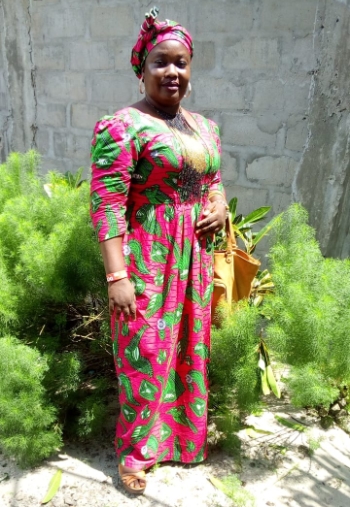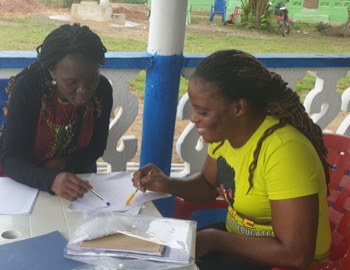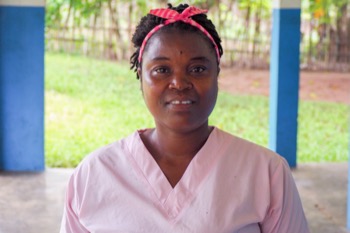A leadership development programme offers new perspectives and tools for tackling workplace challenges
To enable progress towards universal health coverage, staff in the Liberian health system have to make smart use of limited resources. Through a German-supported leadership development programme, county health officials and facility heads are learning to concentrate on the challenges within their reach – and to keep the focus on service delivery.
Liberia is working to build a resilient health system following the Ebola outbreak of 2014-2016. As part of its Pro-Poor Agenda for Prosperity and Development, the Government of Liberia has committed to move towards universal access to basic health services for all Liberians. Much of the day-to-day responsibility for these efforts falls to staff at the county, district and facility level who work under extremely difficult conditions – and in some cases without being trained for the managerial and supervisory roles they are performing.
How county health officials and the heads of health facilities, who are often referred to as Officers-in-Charge (OICs), rise to the challenges around them – poor infrastructure, shortages of personnel, heavy reporting burdens, stock-outs of essential medicines and consumables, and unreliable power supplies – is critically important: the decisions they make, the tasks they prioritise, and the working relationships they build with their colleagues have significant implications for the quality of health service delivery.
In the face of acute resource constraints, Liberia urgently needs to get ‘more health for the money’ – and better leadership and management skills are one part of the answer. This is why the Liberian-German Health Programme, implemented by GIZ on behalf of the Federal Ministry for Economic Cooperation and Development (BMZ), has been supporting two interlinked leadership development programmes for members of County Health Teams (CHTs) and OICs in Southeast Liberia. Equipped with new skills and ways of thinking, CHT supervisors and health facility heads are being empowered to take the initiative and lead the way to better health.
The Leadership Development Program Plus (LDP+) for CHTs

CHTs are responsible for all aspects of service delivery at the county level, and the extent to which their members work together, across their individual portfolios, has a great bearing on overall health system performance.
‘It’s clear that better management improves health outcomes,’ says Damien Bishop, the director of the Post-Ebola Health System Strengthening project, a part of the Liberian-German Health Programme which focuses on building resilient health systems. ‘While the County Health Officer plays a key role, a lot comes down to how well members of his or her team work together.’
The project saw potential to improve local health system performance by focusing on management and leadership issues as part of its work on Human Resources for Health. It identified the Leadership Development Program Plus (LDP+) methodology as an effective way of building these capacities in Southeast Liberia. LDP+ is an experiential learning and performance improvement process, developed by Management Sciences for Health with support from USAID, which has been used in more than 40 countries to transform how health services are delivered. The approach has a dual focus: unlocking individual leadership potential and promoting more effective teamwork. Over a six- to nine-month period, participants work in small ‘improvement teams’ during and between LDP+ workshops to define and tackle real workplace challenges. External coaches, who are often experts in specific technical areas, provide them with additional support.
The Ministry of Health embraced the suggestion, set up a governing body to guide the process from the central level, and made coaches available to support the small groups. GIZ contracted the Liberian organization DEN-L to facilitate the LDP+ process in all five counties of Southeast Liberia. In each county 16 members of the County Health Team, including the County Health Officer, were selected for participation. One-quarter of the participants were women.
Focusing on things that can be changed
A core element of LDP+ is the ‘Challenge Model’, in which participants learn to analyse the situation at their workplace, identify a challenge that is within their control to address, and come up with action plans to achieve a measurable change in their performance. Following a participatory baseline assessment that highlighted areas of strength and weaknesses in six core technical areas aligned to the WHO health system building blocks, five-person improvement teams in each county applied the challenge model to specific health system priorities, including internal governance, health information systems, infection prevention and control, and antenatal care coverage.

The CHTs are still working on their projects, but there are some early signs of success. In Sinoe County, one of the teams set out to improve communication and decision-making by increasing the frequency of county health team management meetings and ensuring that action points from meetings were distributed and acted upon. They saw that when senior officials were on duty travel out of the county, meetings tended not to be held. There were also not clear procedures for documenting and sharing decisions taken during meetings. As a result, activities in the county were often uncoordinated or did not happen as planned.
Estella Dandy, the Mental Health Coordinator in Sinoe County, was part of this team: ‘Since LDP+ there’s been a big change. We now have a meeting every Wednesday, regardless of who is present in the county, and there is a standing agenda. This has been a good change for the CHT, and for the county. Issues are brought to senior management team and prompt feedback is now going to the health facilities.’
‘The Challenge Model was an eye-opener for many participants,’ says Augustine Tweh, the lead facilitator with DEN-L. ‘They’d been to plenty of trainings before, but they’d never been asked to prioritise the issues they themselves could work on to improve service delivery.’ The distinction between a challenge (something over which one has control) and a problem (something over which one doesn’t have control) came as a revelation: ‘In the past we’ve spent too much time planning for things we have no control over, and when we fail, we blame others,’ said Karsloh Turo, County Health Services Administrator from Sinoe County. ‘I’ve learned something very important: that it’s good to plan things that are within our own control.’
More effective teamwork in the context of delegated authority
LDP+ has also influenced the way some local officials think about teamwork and shared goals. According to Nee-Alah Varpilah, an advisor with GIZ, at the outset some participants were hardly aware of service delivery targets for their county and didn’t see them as pertinent to their work. ‘As a result of the programme, they now meet as teams to discuss priorities and to come up with ways to meet targets,’ he says.
Korlu Bryant, an official in the Quality Assurance Unit at the Ministry of Health in Monrovia and a coach for the LDP+, believes that the process has pushed CHT members to think about their roles differently. ‘They’ve had to grapple with what it means to translate quality standards in facilities and in communities,’ she says. ‘The coaching has allowed them to understand leadership in our Liberian health system in a new way.’

For Dr Siana Jackson Mentoe, the County Health Officer of Grand Kru County, the LDP+ workshops and coaching have helped to clarify roles within the CHT and put decision-making processes onto a better footing. ‘LDP+ has led to a better understanding of the organogram of the county health system. Everyone now knows their roles, and there is no more overlapping of functions.’ Moreover, the workshops have made it clearer that the County Health Officer should not and cannot be involved in every decision. ‘Staff members now know that they can address their questions directly to the relevant department, who will decide in turn when I need to be involved.’
Adapting LDP+ for Officers-in-Charge
The Employment-oriented Support to Women in the Health Sector project, which is also part of the Liberian-German Health Programme, works to support the professional advancement of women in health professions in Liberia. Although women outnumber men in many health cadres, including nursing and midwifery, they are under-represented in management positions, especially at decentralised level in the counties. This is due in part to a lack of individual management capacities.
‘When you look at clinics and health centers, you see that the OICs are often nurses or physician assistants with little or no management training,’ notes Viktor Siebert, who heads the project for GIZ, explaining the decision to adapt the LDP+ approach for OICs. ‘Our idea was that a focus on individual leadership and professional development could position them to take on higher-level positions in the county in the future, while also helping them to better manage the small teams at their facilities.’
In early 2019 GIZ started working with the international health organization Jhpeigo and the Liberian Board for Nursing and Midwifery to train 75 OICs, two-thirds of them women, from the five counties of Southeast Liberia. The Health Facility-Leadership Development Programme (HF-LDP) followed the same core content as the LDP+, but participants carried out individual projects linked to issues they were grappling with in their own facilities, rather than working in small groups.

Varwo Sirtor-Gbassie, the lead facilitator with Jhpiego, believes one of the strengths of the model is the chance it gives participants to apply what they learn from the workshops in close to real time. ‘The workshop content is closely linked to concrete challenges in participants’ daily work,’ she says, ‘and the approach is structured in such a way that it helps people to take specific action at the right moment in time.’
Many of the OICs built their individual projects around service coverage targets which their facilities were failing to meet. Using the Challenge Model, they analysed the factors under their control which were influencing their performance and identified things they could do, along with their staff, to change this. Facilitators with Jhpiego and the Liberian Board for Nursing and Midwifery coached them along the way, encouraging them to adopt more inclusive forms of leadership.
‘It’s changed how I think about my work and about myself’

Youngor Korlewala, the OIC at Rock Town Clinic in Maryland County, is a registered nurse. In addition to working directly with patients, she also has to supervise her staff, complete all the reporting for the district office, and handle regular crises, such as when the solar fridge malfunctions and the cold chain is compromised, or when the clinic’s motorbike breaks down, leaving them no way to reach outlying communities. The responsibilities are so many and diverse that she finds it difficult to know what to prioritise at any given time.
‘I’m so happy that I was called upon for this programme,’ Korlewala says. ‘I’ve learned how to identify the gaps at my facility, to scan the environment and see what needs to be done.’ For her project Korlewala worked with her team to bring up the number of monthly BCG vaccinations at the clinic. Rather than telling her staff to solve the problem by themselves, she worked with them to conduct outreach visits in the community. Between April and August they immunised 42 babies, drawing closer to the facility target of 13 per month. ‘This programme has changed the way I think about my work and about the kind of leader I want to be,’ she says.
Female OICs share experiences in ‘management circles’
As part of the HF-LDP program, the female OICs were invited to take part in a series of ‘management circles’ – facilitated discussions in which women could freely share experiences about the challenges they face in their careers, in their workplaces, and in balancing their professional and domestic roles and responsibilities. Women spoke frankly about being passed over for promotions because of the assumption that they needed to remain close to their families, about being asked to complete menial tasks which men are not asked to do, and about feeling overlooked and undervalued. Another topic was the ‘tightrope’ which female professionals in Liberia need to walk between being seen as likeable (a ‘typical’ feminine trait) and competent (a more masculine one).

The management circles were the first of their kind in this part of Liberia and had a big effect on the participants: ‘As a result of the discussions, many of the women realised that they need to think differently about their roles at work and about how they can contribute more,’ says Varwo Sirtor-Gbassie. ‘It also made them realise they’re not alone – not only can they talk about these things together, but they can also do something about it.’
In some of the counties, female members of the CHT also attended the management circles, helping to forge links between women managers at the facility and county level. Interest was expressed in continuing the meetings, possibly in conjunction with the quarterly meetings which OICs attend in every county.
‘Leadership can happen at all levels’
The enthusiastic response to the two programmes shows that CHT members and OICs are eager to find ways to overcome the challenges which frustrate them and want to contribute more to the shared goal of providing quality basic health services. While management training programmes are not a quick fix for entrenched structural problems, they can give staff with direct responsibility for health service provision some new tools and ways of thinking about their workplaces. This is particularly valuable in areas such as Southeast Liberia, where professional development opportunities are limited.
The idea of ‘leading from behind’ – as opposed to traditional notions of ‘leading from above’ – was well received by participants in the two programmes. ‘I’d always thought that leadership can only be practiced by those in positions of power,’ said Taynie Fissibue, the Reproductive Health Supervisor from Sinoe County. ‘But now I understand that leadership can happen at all levels. We can also be leaders.’
Karen Birdsall, November 2019

